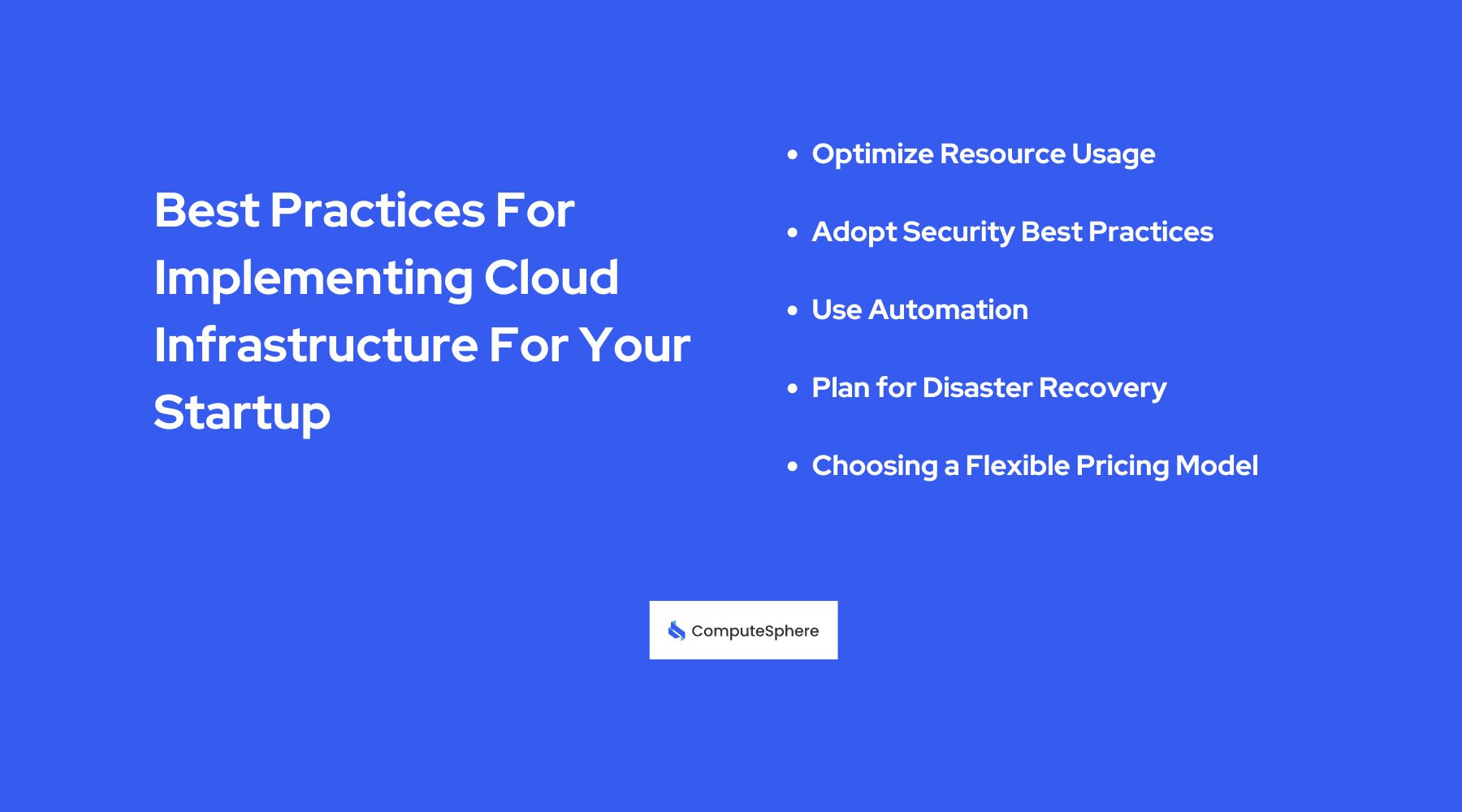How to Build a Cost-Effective Cloud Infrastructure for Your Startup?

For startups, where growth and scalability are important, having a cost-effective cloud infrastructure is not just an advantage but a necessity. Startup founders can face many unique challenges, including limited budgets, the need for rapid deployments, and the ability to scale up quickly. This is where cloud hosting comes into play, offering a solution to these challenges.
In this article, learn about how to get cost-effective cloud infrastructure for your startup and how cloud hosting can be a game-changer.
Why is Cloud Infrastructure Important for Startups?
Startups operate in an environment of constant change and uncertainty. Traditional IT infrastructure can be expensive and hard to manage, making it difficult for startups. Cloud infrastructure, on the other hand, provides you with a flexible, scalable, and cost-effective solution. By using cloud services, you can access powerful computing resources without needing significant upfront investment. Moreover, you don’t need time and effort to manage and look after the IT infrastructure.
What are the Advantages of Cloud Hosting for Startups?
1. Scalability
One of the most significant advantages of cloud infrastructure is its scalability. Startups can start small and scale their operations as they grow. Cloud hosting allows businesses to increase or decrease their computing resources based on demand, thanks to elastic computing services. This means you can avoid the high costs and only pay for the resources used.
2. Cost Efficiency
Cloud infrastructure for startups can lead to substantial cost savings. Traditional IT infrastructure requires significant capital expenditure for hardware, software, and maintenance. In contrast, cloud computing operates on a pay-as-you-go model, which means you only pay for the resources used. This model reduces capital expenditure and lowers operational costs, as the cloud provider takes care of maintenance and upgrades.
3. Agility and Flexibility
Startups need to be agile and able to respond quickly to market changes. Cloud hosting provides the flexibility to deploy applications and services rapidly. Startups can experiment with new ideas and pivot soon, if necessary, without being constrained by their IT infrastructure. This agility is crucial for startups seeking a competitive edge in their industry.
4. Enhanced Collaboration
Cloud infrastructure helps your team collaborate effectively by providing access to applications and data from anywhere, at any time. This is particularly important for startups with distributed teams or those that need to collaborate with partners and customers across different locations. Cloud hosting ensures everyone can access the same information, improving communication and productivity.
5. Security and Compliance
Security is a major concern for startups, and cloud providers invest heavily in securing their infrastructure. Cloud service providers often include advanced security features such as encryption, firewalls, and intrusion detection systems. Additionally, they comply with various industry standards and regulations, ensuring startups can meet their compliance requirements without significant investment.
What are The Key Components of Cost-Effective Cloud Infrastructure for Startups?
To fully use the benefits of Cloud hosting, you need to understand the following key components of a cost-effective cloud infrastructure:
1. Compute Resources
Compute resources, such as virtual machines (VMs) and containers, are the backbone of cloud infrastructure. Startups can choose from a variety of instance types and configurations to match their specific needs. Cloud hosting providers offer a range of computing options, from low-cost instances for development and testing to high-performance instances for production workloads.
2. Storage Solutions
Cloud storage solutions provide scalable and durable storage for startups' data. Options include object storage for unstructured data, block storage for databases and applications, and file storage for shared file systems. Cost-effective cloud infrastructure for startups should include a mix of storage solutions to meet different needs and optimize costs.
3. Networking Services
Networking services connect cloud resources and enable communication between them. Key components include virtual private clouds (VPCs), load balancers, and content delivery networks (CDNs). These services ensure that applications are accessible, prosecution, and secure. Cloud hosting providers offer a range of networking services to support startups' needs.
4. Managed Services
Managed services simplify the management and operation of cloud infrastructure. These services include managed databases, monitoring and logging, and application deployment tools. By using managed services, startups can focus on building their products and services rather than managing infrastructure.
How to Choose the Right Cloud Provider For Your Startup?
When planning to build a cost-effective cloud infrastructure, selecting the right provider is important. Here are some factors to consider when evaluating cloud providers:
1. Pricing Model
Different cloud providers have different pricing models. You should look for a provider with a flexible pricing model that aligns with your budget and usage patterns. Cloud hosting providers often offer cost calculators and tools to help you estimate costs and choose the most cost-effective options.
2. Service Offerings
The range of services a cloud provider offers can impact the infrastructure's overall cost and performance. Startups should evaluate the provider's computing, storage, networking, and managed services to ensure they meet their needs. Cloud computing providers with a comprehensive suite of services can provide a one-stop solution for startups.
3. Performance and Reliability
Performance and reliability are critical factors for cloud infrastructure. Startups should seek a cloud provider with a strong track record of operation time and performance. Cloud hosting providers often publish their service level agreements (SLAs) and performance metrics, which can help you make informed decisions.
4. Support and Documentation
Cloud hosting providers with good support and documentation are essential for your startups, especially those new to cloud computing. Startups should choose a provider that offers comprehensive documentation, tutorials, and support channels. Cloud hosting providers with robust support and community resources can help startups get up and running quickly.
What are the Best Practices for Implementing Cloud Infrastructure?

To maximize the benefits of cloud hosting, startups should follow best practices for implementing their cloud infrastructure:
1. Optimize Resource Usage
Startups should continuously monitor and optimize their resource usage to avoid unnecessary costs. This includes optimizing instances, auto-scaling, and taking advantage of spot and reserved instances. Cloud hosting providers often offer tools and services to help startups maximize resource usage and reduce costs.
2. Implement Security Best Practices
Security should be a top priority for your startup. Implementing security best practices, such as using multi-factor authentication, encrypting data at rest and in transit, and regularly updating and patching systems, can help protect the cloud infrastructure. Cloud hosting providers offer a range of security features and services to help startups secure their environment.
3. Leverage Automation
Automation can significantly improve the efficiency and reliability of your cloud infrastructure. Startups should use automation tools and services to streamline deployment, management, and scaling of their resources. Cloud hosting providers often offer automation services, such as infrastructure as code (IaC) and continuous integration/continuous deployment (CI/CD) pipelines.
4. Plan for Disaster Recovery
Disaster recovery planning is essential for ensuring the availability and resilience of cloud infrastructure. Startups should implement backup and recovery strategies to protect their data and applications. Cloud hosting providers offer disaster recovery services, such as automated backups and cross-region replication, to help startups implement robust disaster recovery plans.
Conclusion
Cost-effective cloud infrastructure is an important component of startups' success. Cloud hosting provides the scalability, flexibility, and cost savings that help your startup thrive in a competitive environment. By understanding the key components of cloud infrastructure and choosing the right provider, you can have a cost-effective and hassle-free IT infrastructure. Moreover, by following the best practices, you can build a robust cloud environment that supports your startup’s growth and innovation. As startups continue to evolve and disrupt industries, leveraging Cloud hosting will be crucial to their ability to succeed and scale.
Contents
Built for Builders. Priced for Startups.
Tired of unpredictable cloud bills? ComputeSphere offers modular, fixed-cost cloud hosting that grows with your startup—no DevOps headaches, no surprises.
Get StartedShare this article
Browse Some Related Blogs
Relevant and related contents you can read









